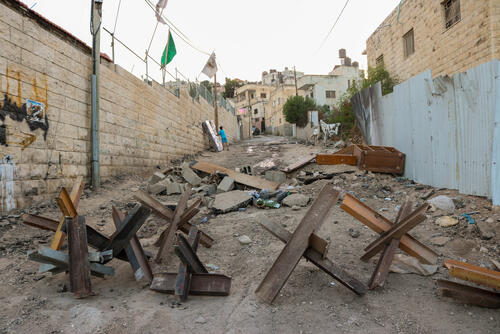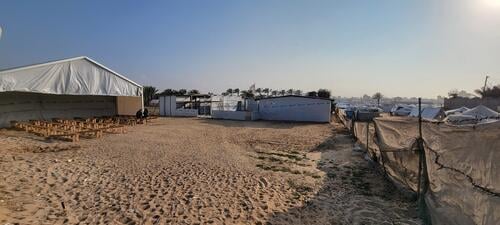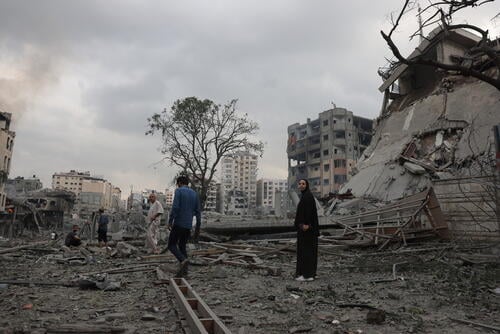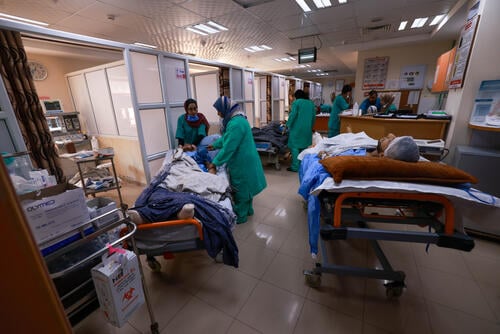It’s 2.30 am and doctors are huddling outside the entrance to Jenin hospital, supported by Médecins Sans Frontières (MSF), in the West Bank, Palestine. A brief lull in the ricocheting gunfire is followed by the sound of men shouting and the screeching of tyres, as a three-wheeled auto-rickshaw, or tuk-tuk, turns into the gates of the hospital. Soon, the bundle of bloody bodies on the back starts to take shape.
Young men with bullet holes in their abdomens and lower thighs are laid on stretchers and pushed to the emergency room, where they are examined, bandaged and rushed to the operating theatre.
“Most of the patients we receive have been shot in the abdomen and the legs,” says Dr Pedro Serrano, MSF intensive care unit doctor. “Some have had their liver and spleen shattered, while others have severe vascular injuries.”
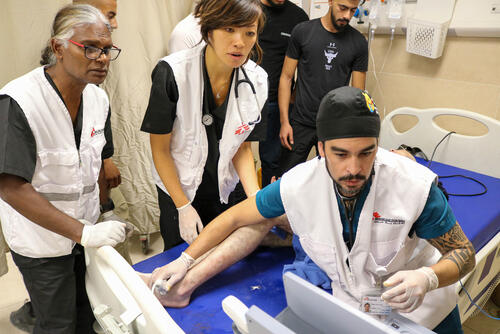
“We had one very sad case of a guy who was walking just outside the hospital entrance when he was shot in the head by a sniper,” says Dr Serrano. “The violence is ongoing and most patients we receive have life-threatening injuries.”
Since the deadly war on Gaza began on 7 October, there has been an overspill of violence across the West Bank. In Jenin, MSF emergency doctors have been called to the public hospital nearly every night, as Israeli incursions with tanks and ground troops batter the city. Over the past month, Israeli forces have killed 30 people and injured at least 162 more in Jenin city alone.Numbers from the Palestinian Ministry of Health
Local paramedics in Jenin refugee camp have to use a tuk-tuk, donated by MSF, to weave through the narrow alleyways of the camp to collect the wounded. Israeli forces often block the entrance of the camp, making it near impossible for ambulances to get in and out with the critically wounded in time to save their lives.
Outside the hospital, an ambulance pierced by bullet holes is surrounded by a group of paramedics who stare blankly into the buzzing night. One says they were shot at while attempting to reach wounded people in the camp, forcing them to evacuate the ambulance and take cover on the ground for 20 minutes until the Israeli forces left.
Most of the patients we receive have been shot in the abdomen and the legs. Some have had their liver and spleen shattered, while others have severe vascular injuries.Dr Pedro Serrano, MSF intensive care unit doctor
The trail of destruction can be seen not only through the people with gunshot and shrapnel wounds at Jenin hospital, but also in the city itself. There, infrastructure and symbolic Palestinian buildings have been torn up and destroyed by bulldozers and tanks.
Violent incursions and incidents are not unique to Jenin. Across the West Bank, 165 Palestinians have been killed since 7 October and more than 2,400 have been injured, according to the Palestinian authorities.
In addition, as many as 6,000 Gazans who had jobs in Israel before the war, but whose work permits have since been cancelled, now find themselves living in displacement centres across the West Bank, according to the Palestinian Ministry of Labour.
MSF teams visit these displacement centres to donate medical supplies, including medications for non-communicable diseases, and offer mental health support. Some patients have told MSF staff that they were beaten, humiliated and abused while being detained by Israeli forces in the weeks since 7 October.
“We have treated some patients who showed signs of being tied up and beaten, reportedly by Israeli forces,” says Yanis Anagnostou, MSF mental health activity manager in Jenin. “They report being tormented for several hours before being left at the West Bank border.”
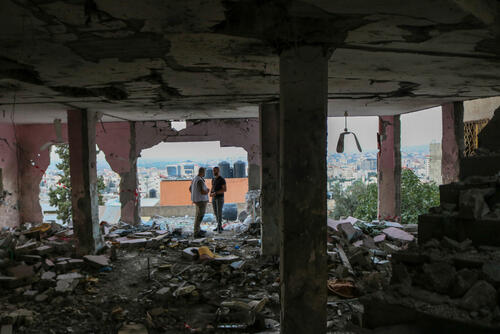
Violence and forced displacement
In Hebron governorate in the south of the West Bank, violence involving Israeli forces and settlers, forcible displacement, and restrictions on people's movements have impacted every aspect of Palestinians’ everyday lives. Local people have told MSF teams, who have worked in the area since 2001, how they feel unsafe even walking down their own streets and how their access to basic services, including food markets and healthcare, is heavily restricted.
Since 7 October, at least 111 Palestinian families, comprising around 905 people, have had no choice but to leave their homes in the West Bank due to violence and intimidation by Israeli forces and settlers, according to the UN.
In South Hebron Hills, among the dozens of families displaced from their homes, two families were forced to leave after settlers burnt their home, stole solar panels and water barrels, and cut water pipes. Our teams responded by providing mental healthcare and displacement kits to those affected.
MSF teams based in Hebron are also providing families with essential relief items, including blankets, mattresses and heaters, as well as offering mental health support to people who have been exposed to violence or forcibly displaced from their homes.
We speak to our children back in Gaza and we cry. I wish they would send me back to Gaza, where my children and grandchildren are.Zouhir, a displaced Gazan in the West Bank
“One woman, whose home was burned to the ground, told me how unsafe, afraid and insecure she still feels,” says Mariam Qabas, MSF health promotion supervisor in Hebron. “‘She told me: ‘I never thought of leaving my land or house like this, but I cannot risk my sons and my family. I cannot see the future; I feel helpless and powerless.’”
“These are completely normal reactions to such abnormal circumstances, where people are facing intense violence and insecurity,” says Qabas.
MSF urges Israeli authorities to show restraint in the West Bank, to put an end to the violence and forced displacements of Palestinians. They must stop implementing restrictive measures that impede the ability of Palestinians to access basic services, including medical care.
As the bombardments and collective punishment of people in Gaza continue unabated, and the lawlessness and bloodshed spills over to the West Bank, the need for a ceasefire is more desperate than ever.
Zouhir, like many other Gazans displaced across the West Bank, has been following the events in Gaza from a crowded sports hall in Jenin, where he and hundreds of other displaced workers sleep.
“Today, our suffering is that we are away from our children and our families,” he says. “We speak to our children back in Gaza and we cry. I wish they would send me back to Gaza, where my children and grandchildren are. Our suffering is that we are powerless, and we can’t do anything.”



